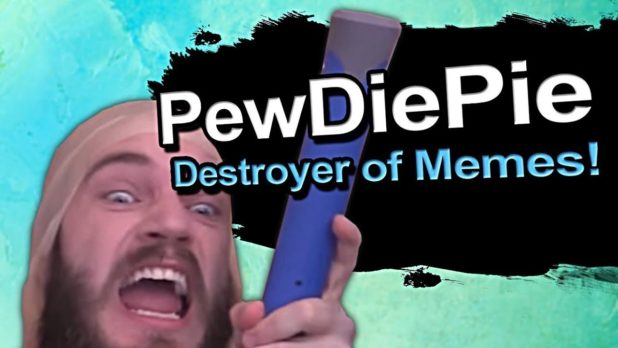Adrian Sol
Daily Stormer
September 12, 2018
Shhh… No more memes, now. Only cuckoldry.
So, the EU proposed a law a while back which would effectively make memes illegal, by forcing all tech companies to verify each and every image and video submitted to their sites by users for “copyright infringement.”
These tech companies protested against this insanity, because exercising that level of control would be more or less impossible, unless they just stopped allowing people the ability to post content altogether. Faced with this resistance, the EU paused to reconsider, and we all thought we had dodged the bullet.
Alas, now that these bureaucrats have had time to reflect on this, they’ve made their decision. And the memes have got to go.
If these fools had just waited a bit longer, PewDiePie would have destroyed all the memes for them – by reviewing them.
The European Parliament has voted in favor of the Copyright Directive, a controversial piece of legislation intended to update online copyright laws for the internet age.
The directive was originally rejected by MEPs in July following criticism of two key provisions: Articles 11 and 13, dubbed the “link tax” and “upload filter” by critics. However, in parliament this morning, an updated version of the directive was approved, along with amended versions of Articles 11 and 13. The final vote was 438 in favor and 226 against.
The fallout from this decision will be far-reaching, and take a long time to settle. The directive itself still faces a final vote in January 2019 (although experts say it’s unlikely it will be rejected). After that it will need to be implemented by individual EU member states, who could very well vary significantly in how they choose to interpret the directive’s text.
For all intents and purposes, this is a done deal.
This is what happens when you let clueless, corrupt boomers take decisions about things they can’t understand. Hell, even I’m having trouble processing the ramifications of this law.
It’s like if some retard got the infinity gauntlet and remade reality to be “random and weird lol.”
The most important parts of this are Articles 11 and 13. Article 11 is intended to give publishers and papers a way to make money when companies like Google link to their stories, allowing them to demand paid licenses. Article 13 requires certain platforms like YouTube and Facebook stop users sharing unlicensed copyrighted material.
Critics of the Copyright Directive say these provisions are disastrous. In the case of Article 11, they note that attempts to “tax” platforms like Google News for sharing articles have repeatedly failed, and that the system would be ripe to abuse by copyright trolls.
Article 13, they say, is even worse. The legislation requires that platforms proactively work with rightsholders to stop users uploading copyrighted content. The only way to do so would be to scan all data being uploaded to sites like YouTube and Facebook. This would create an incredible burden for small platforms, and could be used as a mechanism for widespread censorship. This is why figures like Wikipedia founder Jimmy Wales and World Wide Web inventor Tim Berners-Lee came out so strongly against the directive.
Companies like Google are normally happy when regulation increase the cost and complexity of doing business. It makes it much easier to maintain a monopoly, by crushing smaller players under a regulatory burden they can’t possibly bear.
McDonald’s can afford to buy $250,000 worth of stainless steel kitchen implements for each of their restaurants. But the small corner deli can’t.
The fact that even Google and Facebook oppose this just goes to show how insane it is – the biggest players in the game are afraid that even they won’t be able to withstand that level of regulation.
It’s like if the government decreed that restaurant kitchens now have to be completely sterilized of all bacteria every 15 minutes.
It’s impossible.
So what now? I can see many scenarios playing out:
- Tech companies all have to either offer crippled services to the European market, or block EU countries altogether from accessing their sites. They lose money, of course, but the EU loses even more as their tech industry totally collapses.
- Tech companies basically ignore the new law and operate as usual, and simply refuse to pay the fines (which will be astronomical). This, of course, is only possible for non-European companies. Eventually, the EU has to start blocking most foreign sites with a China-style firewall.
- Companies start embracing technologies like tor and cryptocurrencies to bypass the censorship and offer their services globally. For example, Google could implement tor and bitcoin wallets right into their Chrome browser.
- Big players try their best to conform to the EU’s new standards, and go bankrupt one by one by the outrageous costs involved, not to mention the fines they’d have to pay for each violation. The only players left standing are small, local companies who avoid dealing with all that bullshit.
I have no idea which of these will happen, and in what combination. I suspect none of the bureaucrats who approved this law do, either. They probably think they’ll just get a bit more tax income and finally be rid of those pesky internet memes.
But frankly, if you think about it, a lot of the possible outcomes would be good for us. Because if doing legitimate business is now impossible on the internet, the only people left in the game will be rebellious rascals like the Daily Stormer.
You want memes, kid? Hop on in.
The “regular internet” will, for Europeans, become a barren wasteland bereft of content, while the “dark web” will be where all the fun stuff is.
They really should have thought this through.





